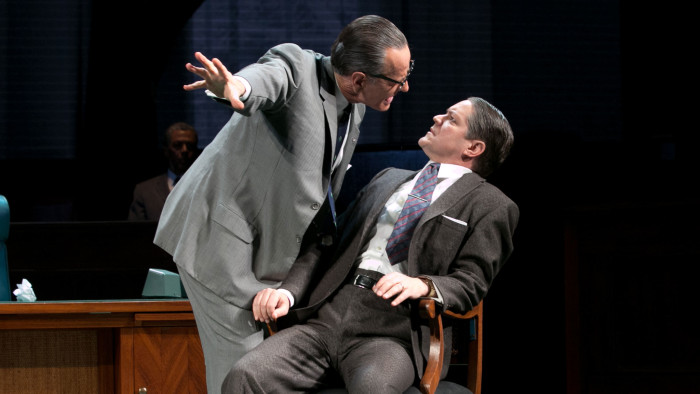All the Way, Neil Simon Theatre, New York

Simply sign up to the Life & Arts myFT Digest -- delivered directly to your inbox.
Lyndon Baines Johnson, who felt perpetually unloved as America’s 36th president, would probably not derive much reassurance from the crowds flocking to see Robert Schenkkan’s new Broadway play, All The Way. The popularity of this three-hour evening, which is more historical pageant than taut drama, derives not from the appeal of its main character, LBJ, but from the popularity of the actor portraying him, Bryan Cranston.
Cranston, of course, was the star of Breaking Bad , the TV drama whose fans tend to be as hyped-up as users of the programme’s central drug: crystal meth. The pace of All The Way, which unfolds from November 1963, when Johnson succeeds the assassinated John F Kennedy, to November 1964, when LBJ is elected president in his own right, is less meth-quick than bourbon-leisurely.
Animated by a crass fondness for insult, Schenkkan’s Johnson cannot persuade us to like him but he will bully us into respecting him. He uses his horse-trading acumen to round up votes for his Civil Rights Act, shaming Hubert Humphrey (the excellent Robert Petkoff) into working harder and telling Richard Russell, LBJ’s mentor in the Senate (the slyly underplaying John McMartin), to realise that his racist era is waning.
Robert Caro, LBJ’s voluminous biographer, spent his most recent instalment describing the venomous feud between Johnson and Robert F Kennedy. With help from director Bill Rauch, Schenkkan concentrates on the more thematically neat contrast between Johnson and Martin Luther King, Jr. If this pairing ultimately creates a nobler vibe than an LBJ/RFK focus, it also leads the dramaturgy into blunt, slogan-reliant exchanges.
Unfolding against the backdrop of a tiered, Congressional-theatre set, the play is made watchable by its eerie topicality and by the performance of Cranston. Observing FBI director J Edgar Hoover order round-the-clock eavesdropping on King, an audience cannot help thinking about the even more pervasive technology of America’s national-security apparatus today.
Cranston’s performance yields a more visceral pleasure. The actor doesn’t resemble LBJ physically but he masters enough body language – embattled facial expression, upper body thrust back in defiance – to suggest a psychological portrait more nuanced than that provided by the script.

FT Magazine: Interview with Bryan Cranston
Comments